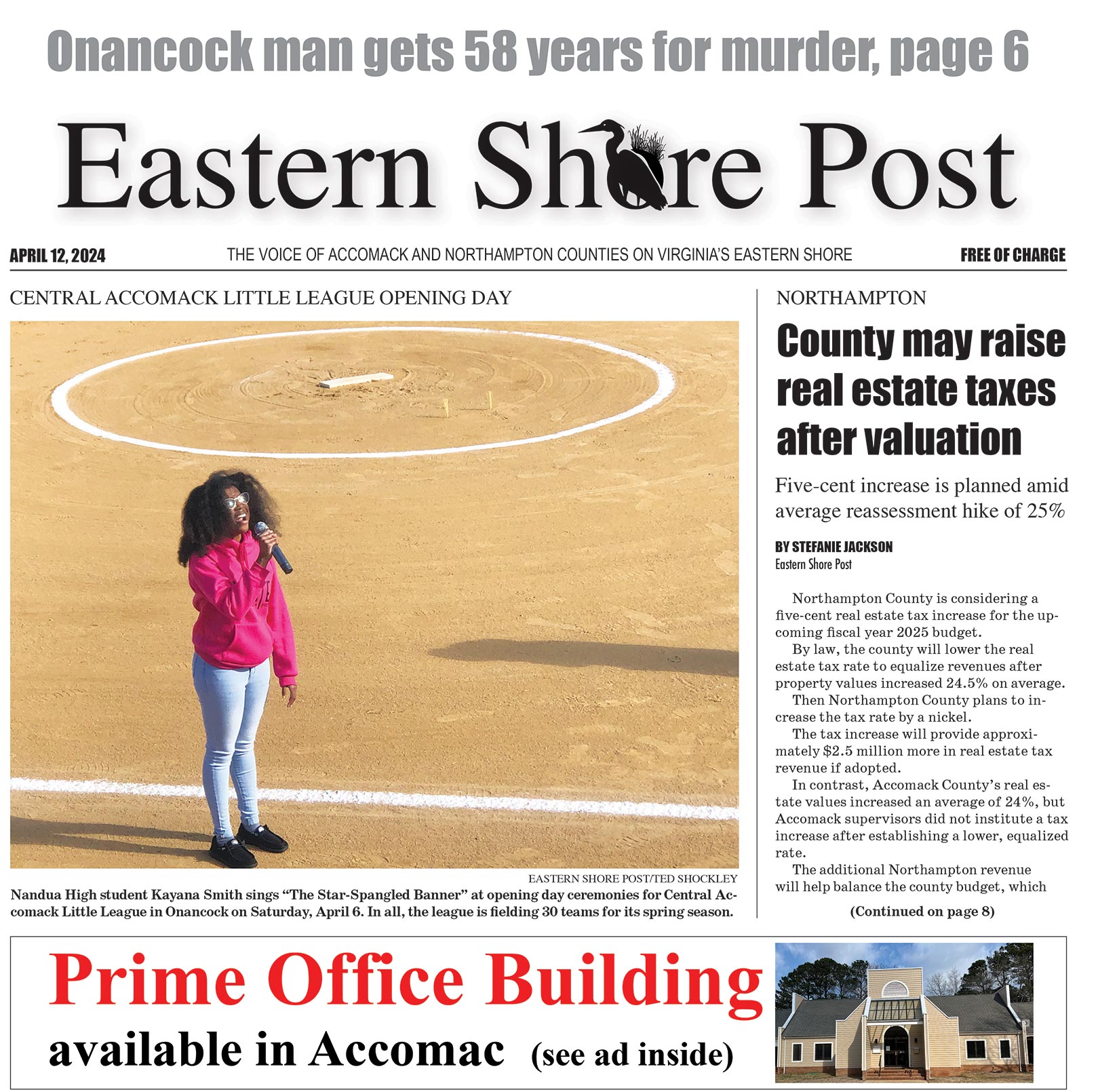By Stefanie Jackson
Internet service provider Eastern Shore Communications, one of three local ISPs, met with Northampton supervisors Jan. 8 not to discuss the ISP’s latest contributions in increasing broadband access on the Shore, but to protest its perceived lack of opportunity for local expansion.
The Eastern Shore of Virginia Broadband Authority (ESVBA), providing high-speed internet access to ISPs that sell the service to end-users, is “directly competing with us” and causing an “imbalance” in the local market, Eastern Shore Communications CEO Ronald Van Geijn said.
(ESVBA was established by Accomack and Northampton counties in 2008 to provide high-speed internet access to the Shore. ESVBA received grant funds from both counties to help cover startup costs, which it paid back even though it was not required to.)
Van Geijn’s visit with Northampton supervisors was scheduled after a press release was issued by the offices of U.S. Sens. Mark Warner and Tim Kaine, which mistakenly stated the ISP received a $1.8 million grant from the U.S. Department of Agriculture Rural Development office to benefit several areas including the Eastern Shore.
The grant was for the Cape Charles-based company to expand its wireless broadband internet business to North Carolina, Van Geijn said. But correcting the record was not his only concern.
He seemed to disagree with ESVBA’s authority to sell internet directly to consumers even though the resolution that established ESVBA stated the broadband authority was needed to provide high speed internet “to local businesses, local government, and the public.”
ESVBA acted as a last-mile provider, supplying high-speed internet directly to government organizations and businesses starting in 2010 and homes beginning in 2016.
“ESVBA is not a middle-mile provider,” ESVBA Executive Director Robert Bridgham recently emphasized. A middle-mile provider typically offers wholesale pricing to companies that provide end-users with high-speed internet at retail prices.
ESVBA was serving the last mile before Eastern Shore Communications signed its contract with the broadband authority in 2012 or Neubeam (another ISP that has publicly criticized ESVBA) signed its contract with the broadband authority in 2015.
ESVBA has an open access network, meaning anyone can subscribe to it, including another ISP.
Bridgham stated, “We do not limit who can buy services” because “allowing any and all to subscribe” will “advance our mission to proliferate broadband on the Eastern Shore.”
Eastern Shore Communications plays a role in that mission. “Developing rural areas is of critical importance,” Van Geijn said. “The incorporated towns have service … but the rural areas – people living out on the necks … those are the ones we’re focusing on bringing service to,” he said.
Eastern Shore Communications and other ISPs, like Neubeam, supply customers with high-speed internet by transmitting it wirelessly from towers, poles, and other tall structures.
“Fixed wireless is a technology that allows for the cost-effective, rapid deployment of high-speed internet service,” Van Geijn said.
Anyone who can see the tower can get service, and towers that can see each other can expand service farther away. The longest distance linking two Eastern Shore Communications towers is about 10 miles, Van Geijn said.
But CEOs of wireless ISPs say they’re losing customers to ESVBA’s fiber-to-the-home service, a “superior product,” Van Geijn said. A wired connection using fiber optic cable provides more secure, reliable, and faster service.
“Once broadband is in there, you’re out of the game?” Supervisor David Fauber asked Van Geijn.
“Correct,” Van Geijn said.
Eastern Shore Communications wants ESVBA to offer wholesale pricing so it can resell ESVBA’s fiber-to-the-home service. Under ESVBA’s current pricing structure, resale of fiber-to-the-home would be “cost prohibitive,” Neubeam/Declaration Networks Group CEO Bob Nichols said.
ESVBA’s open access network is one reason why wholesale pricing isn’t offered; the broadband authority treats all its customers alike.
To offer wholesale rates to the ISPs, ESVBA would have to raise retail rates for everyone else. Keeping retail prices down is “the right thing to do,” Bridgham said.
“My goal isn’t to make the ISPs money … my goal is to cover the Shore,” Bridgham said.
ESVBA does not offer wholesale pricing, but it does have a program that helps ISPs do business at a reduced cost. The program has two restrictions – the service must be wireless, and it must be beamed from a pole at least 50 feet high. (The minimum height requirement helps ensure signal quality.)
Fauber said to Van Geijn, “I think the market for you in Northampton County is going down to the southern end and … out into the rural parts.” He suggested Eastern Shore Communications continue to develop its wireless service. “If I can get broadband (wired) to my house, you cannot compete against that,” he said.
“Your market is … out to the areas where the wired network is not going,” Fauber said.
“What’s prohibiting them (ESVBA) from going there, too?” Van Geijn countered.
Nichols previously blamed ESVBA for a “lack of cooperation” with the ISPs and said ESVBA’s fiber-to-the-home service is “by definition, almost, it’s overlapping 100 percent of what’s already in place” to provide Shore homes with broadband internet access.
But Bridgham said lawyers have advised against ESVBA and the ISPs “carving out territories” because it could violate the antitrust laws that ensure fair competition in the open market.
Complaints against ESVBA appear to be linked to a misunderstanding of the broadband authority’s intended purpose. ISPs and local politicians continually refer to ESVBA as the middle mile, but Bridgham maintains that “ESVBA is not the middle mile … and never agreed to be.”
Accomack and Northampton’s resolution that established the broadband authority stated it was needed “to provide high speed data service and internet access service to local businesses, local government, and the public,” a description consistent with a last-mile service provider.
Furthermore, ESVBA is not “taxpayer funded,” as some have said. Its operating costs are covered by the revenues it receives from its subscribers.
ESVBA was created by the local government to provide a public service – to provide high speed internet to businesses and homes “to promote economic development” and “for the comfort, convenience, and welfare of the citizens,” according to the resolution.
Though ESVBA is considered a “government entity,” it is neither a governmental department nor taxpayer funded.
ESVBA customers do pay taxes included on their monthly bills, but those consist of a 5 percent Virginia state communications tax and a 15 to 22 percent Federal Communications Commission tax, both of which are mandatory.
ESVBA is a not-for-profit business and neither collects nor pays sales taxes. All revenues are re-invested in the authority to further build out its broadband network across the Eastern Shore.
Ultimately, county supervisors and the broadband authority share the same goal: to act in the best interest of the public.
“We don’t pick winners and losers up here,” Northampton County Board of Supervisors Chairman Spencer Murray said. “Our winners are the citizens of Northampton County. … We have an obligation to them, to get every one of them affordable, high-speed internet as soon as we possibly can.”
Supervisor Robert Duer interjected, “What is not fair is to allow the private sector to develop the market and then have the public sector root them out of that market with unfair pricing, and they go pick up their customers.”
Fauber said, “We still have people that don’t have broadband … that, to me, is unfair.”



